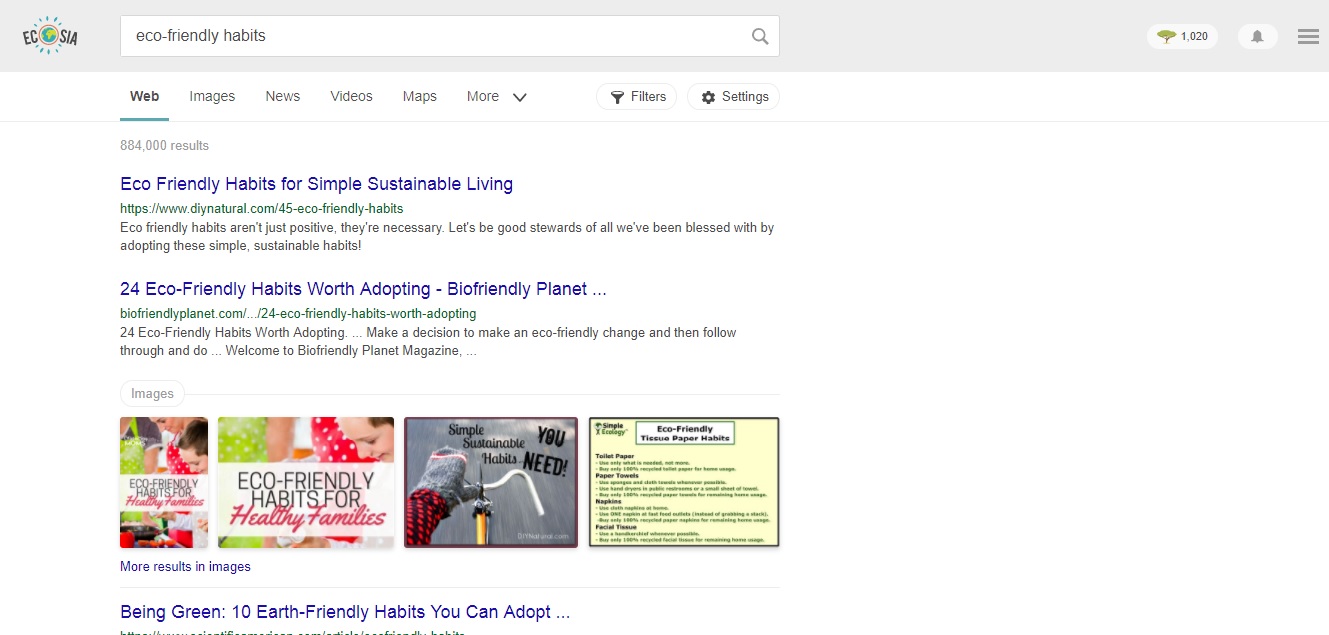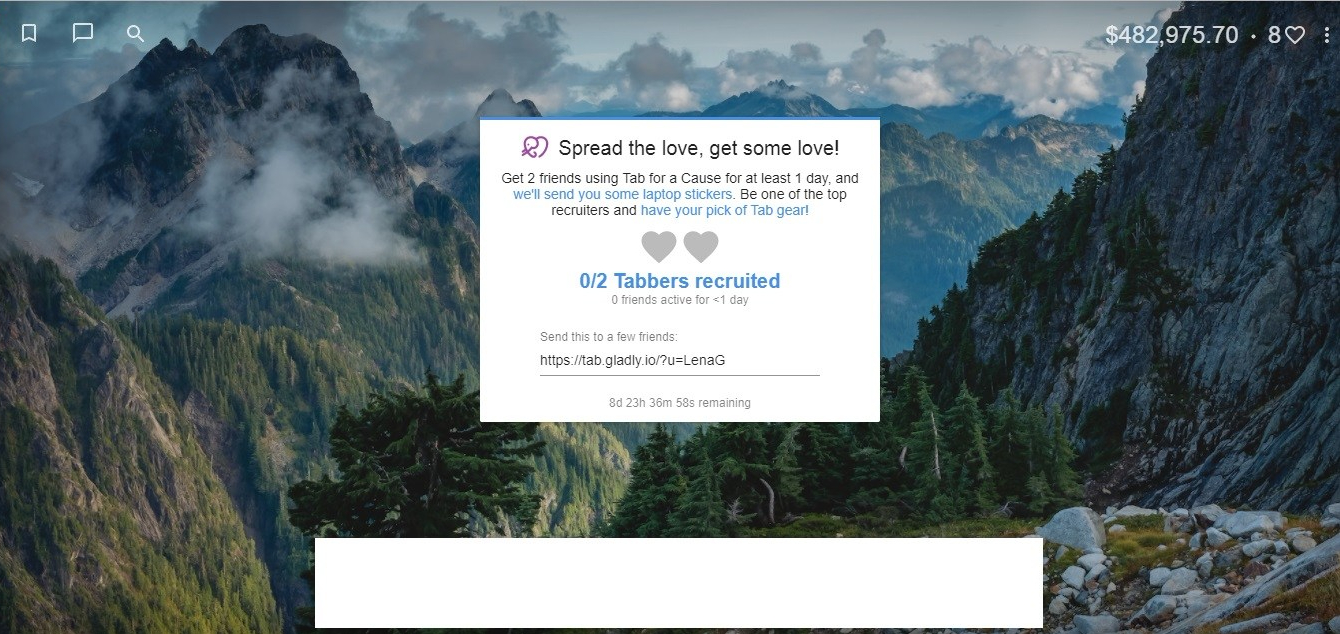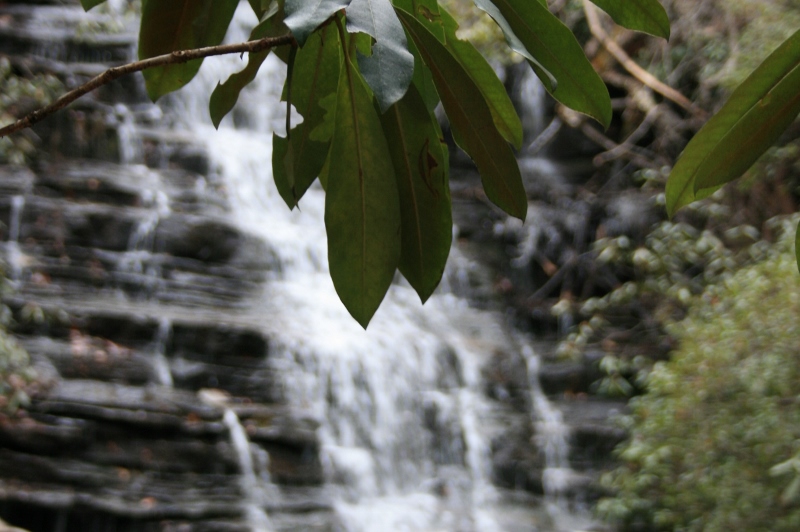Hey friends! I hope you have a lovely day. Today I want to share some ideas for habits you can easily incorporate into your daily routines to live a more eco-friendly, conscious, ethical and happy life! I don’t know about you, but knowing I am doing something good for our environment makes me extremely happy 🙂
Let’s get right into it! Here are my ideas:
Turn your daily internet browsing into acts of charity
About four months ago, I came across two browser applications that actually allow you to raise money for charity while simply surfing the web! I’ve been using them constantly since then and I’m so happy that something as easy as this can help protect the environment and do something good.
1. Install the Ecosia browser application.

Ecosia is a search engine that is powered by Bing. With every search, no matter if you type directly into the address bar of your browser or use ecosia.org, you help Ecosia in planting new trees worldwide. They use at least 80% of their search ad revenue for tree planting projects. It takes approximately 45 searches on Ecosia to plant one tree, which means that in the last four months I have helped to plant approximately 22 trees without putting any effort into it! Ecosia has already planted over 21 million trees worldwide. More trees means less CO2 in the air, which makes this project a very meaningful and honorable one imho. Go try it out, it’s free and just as good as any other search engine!
2. Go get the Tab for a Cause browser extension

Tab for a Cause works similarly to Ecosia, but instead of raising money while searching the web, you raise it with every new tab you open! To date, Tab for a Cause has raised over $480,000 for charity. They work with different charity organizations and you can actually influence which organizations receive the money by “donating” your hearts (one tab = one heart) to your favorite organizations. The orgs change periodically, but the environmental organization Conservation International is always available for donations and they are where most of my hearts go to. However, you can also choose to donate your hearts to social, educational or other organizations. When you install the browser extension, you can choose one of the beautiful background images they offer for your new tabs. You can even add widgets like to do lists. Mine usually just has a clock in the middle which is not visible in the image above because Tab for a Cause actually has a Valentine’s Day campaign at the moment! If you recruit two of your friends to become new ‘tabbers’, you get two of their beautiful laptop stickers!
Reduce your plastic waste
Plastic is one of the biggest threats to our environment and wildlife worldwide. Only a small part of plastic waste gets recycled today which is a fatal problem because the rest, everything that’s not recycled, goes to landfills and often finds its way into our oceans. Whales, seabirds, plankton, fish and countless other animal species are affected by plastic waste that pollutes our oceans. They consume it, they get stuck in it and they die. If this is not changed in the near future, there will be more plastic in the world’s oceans than fish in 2050 (The Guardian). Isn’t this sad? One of the most important things we can do to save our environment and biodiversity is to reduce our plastic waste. So here are some ideas:
3. Get a reusable water bottle.
Duh. I know, this one is probably the number one item on any list that focuses on eco-friendly habits. But it is for a reason! Single-use plastic bottles are so sad because they are so unnecessary. Most public spaces today have water fountains to refill your bottles and even tap water is safe to drink in most areas.
Don’t like plain water? Try infused water using fruit and herbs. It’s sooo good! I usually just put a splash of fresh lemon juice into my water, but I also like mint leaves, basil leaves, cucumber slices or berries.
And while you’re at it – get a reusable coffee mug, too! Just hand them to your coffee shop employee and they will fill it for you.
4. Make your own skin care products.
Did you know that a large number of commercially produced skin care, sanitary and makeup products contain microplastics? It can be found in toothpaste, shower gel, peelings, powder, blush, concealer, you name it. Microplastics pollute our environment and even enter the food chain. They were found in fish, milk, honey and other foods and thus also effect humans. It’s gross.
If you start making more of your daily used products yourself, you can also avoid producing more waste from single-use plastic containers. Just get some glass containers to store your homemade products in and you can avoid all of the nasty stuff. Bonus benefit – homemade skin care products make great gifts! An easy project to start with is to make your own peeling. There are loads of DIY tutorials out there and most of them just contain easily available supplies like sugar and olive oil. Just do some research 🙂 I even know people who make their own shampoo out of rye flour. Just sayin’. Haha!
5. Bring your own (fabric) shopping bags to the store.
Easy af. Just save some of these promotional bags you get everywhere and tell the cashier not to put your groceries into plastic bags.
6. Buy your produce at the farmers market more often.
Fruits and veggies are usually sold without plastic packaging on farmers markets. Added bonus – they often come from local farms, not from green houses. This also means that they are usually more healthy than produce from the grocery store which tends to be less fresh.
More Ideas
And finally I want to share some more tips that are not less impactful and important and close to my heart.
7. Eat more plant-based meals
Factory farming has become the single biggest threat to the environment today. The most eco-friendly diet one can adopt is one that avoids as many animal products as often as possible. If you ever considered becoming vegetarian or vegan, please go and do some more research and think about if this is something you want to try. But even if you don’t want to make that big of a commitment, let me tell you: EVERY meal you choose to prepare without meat or even without milk or eggs makes a difference! <3 If you eat meat and other animal products, you can make a big difference by buying these from local farmers instead of from the grocery store as well.
I don’t feel competent enough or entitled to write about all the negative effects of factory farming, so here are some suggested resources for you to check out:
- I loved the documentary Cowspiracy on Netflix.
- Time.com article
- The Guardian article
Personally, I have wanted to become a vegetarian for years because I always knew how cruelly animals were treated in factory farming. However, I never made real efforts into researching more about the topic because I didn’t want to give up eating meat. Last year, I met my current roommates who both are on a mostly vegan diet and I decided to look into the topic more. It only took me one day of research to make the decision to become vegetarian/mostly vegan, too. I had never thought about the environmental cost of factory farming before but that was what ultimately led me to make that decision and I can honestly say that it was one of the best decisions of my life.
8. Buy more of your stuff from second-hand or vintage sellers
The production of (cheap) clothes, homeware and furniture uses an incredibly huge amount of water and produces greenhouse gases. You can avoid most of this by shopping at the abundance of online platforms or second-hand shops there is today or even by trading stuff with your family and friends. I personally love second hand shopping because you usually can find more unique products that way anyway.
9. All the small things
There are lots of small habits to adopt that save resources and reduce waste:
Turn off the lights in rooms you’re not currently in. Run your dishwasher only when it’s completely loaded. Same goes for your washer – also, only wash your clothes when they actually need to be cleaned, not after one wear. Avoid throwing away food by planning your meals for the week on Sundays. Use a menstrual cup instead of tampons. There is so much more!
10. Go paperless
Whereever possible, ask to receive your documents electronically – bills, bank statements, medical test results, anything. There are even stores now that allow you to sign up for electronic receipts that are sent to your email address after your purchase. My local Fresh Market does that. Try to avoid printing any documents you receive via email at work if you don’t absolutely need them on paper. Read texts on your computer if you can instead of printing 150-page textbook copies that will go to the trash after your class is over.
Here you go, ten easy eco-friendly habits. I hope I inspired you to make some small changes in your life to give our planet some love. What do you think? Do you already practice some of these habits? Will you incorporate some of these ideas into your daily life? Let me know!
Love, Lena. <3
